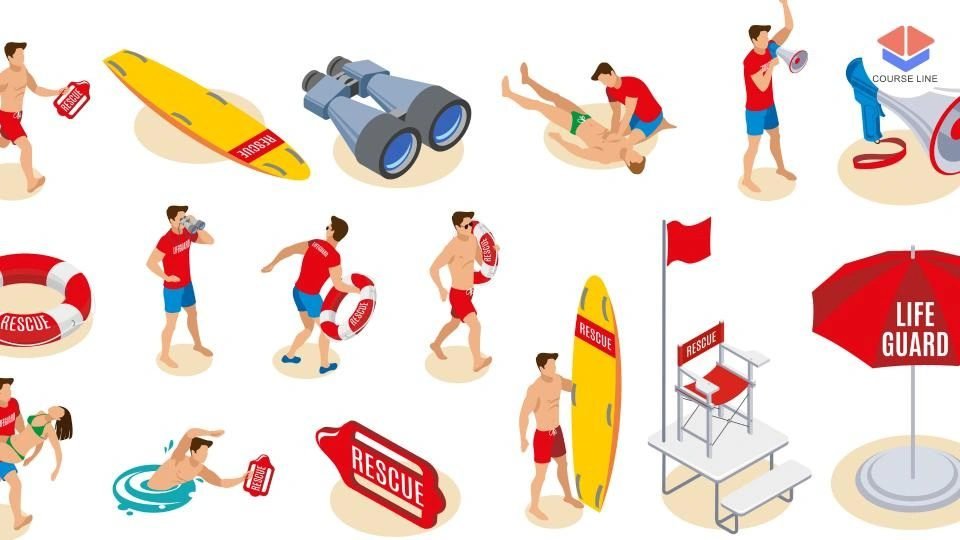Course Features
Price
Study Method
Online | Self-paced
Course Format
Reading Material - PDF, article
Duration
3 hours, 35 minutes
Qualification
No formal qualification
Certificate
At completion
Additional info
Coming soon
- Share
Overview
Drowning prevention and aquatic safety are critical skills that save lives. The Lifeguard Level 5 Advanced Diploma is designed for individuals seeking expertise in lifeguarding, water rescue, and emergency management. This course provides essential knowledge and practical techniques to ensure safety in swimming pools, open water, and aquatic sports facilities.
The program starts with an Introduction to Lifeguarding, covering the roles, responsibilities, and certification requirements for professional lifeguards. Learners gain an understanding of the qualifications and standards required for employment in the field.
The Water Safety and Risk Management module teaches students how to assess aquatic environments, identify hazards, and implement risk reduction strategies. This section is crucial for ensuring preventative safety measures are in place.
The course covers Advanced Rescue Techniques, focusing on in-water and out-of-water rescues, use of rescue equipment, and lifesaving protocols. Learners will develop proficiency in handling emergency situations such as distressed swimmers, unconscious casualties, and spinal injuries.
A key part of lifeguarding is First Aid and Emergency Response, where students are trained in CPR, resuscitation, wound care, and dealing with medical emergencies such as drowning, cardiac arrest, and heat exhaustion. This module emphasizes the importance of quick decision-making and effective emergency action plans.
Legal and ethical considerations play a major role in lifeguarding responsibilities. The Legal and Ethical Responsibilities module covers lifeguarding laws, duty of care, liability, and professional conduct, ensuring lifeguards operate within the appropriate regulatory framework.
Effective Communication and Leadership Skills are crucial in high-pressure situations. This section focuses on teamwork, crisis communication, and public engagement to ensure smooth coordination in lifesaving efforts and rescue missions.
The final module, Lifeguard Training and Education, explores lifelong learning, training programs, and public safety education. Learners will gain insight into training techniques, mentoring, and spreading awareness about water safety to the community.
This diploma is designed to equip students with practical and theoretical knowledge for a successful career in lifeguarding, ensuring they can handle emergencies, prevent aquatic accidents, and save lives in high-risk environments.
Who is this course for?
Drowning prevention and aquatic safety are critical skills that save lives. The Lifeguard Level 5 Advanced Diploma is designed for individuals seeking expertise in lifeguarding, water rescue, and emergency management. This course provides essential knowledge and practical techniques to ensure safety in swimming pools, open water, and aquatic sports facilities.
The program starts with an Introduction to Lifeguarding, covering the roles, responsibilities, and certification requirements for professional lifeguards. Learners gain an understanding of the qualifications and standards required for employment in the field.
The Water Safety and Risk Management module teaches students how to assess aquatic environments, identify hazards, and implement risk reduction strategies. This section is crucial for ensuring preventative safety measures are in place.
The course covers Advanced Rescue Techniques, focusing on in-water and out-of-water rescues, use of rescue equipment, and lifesaving protocols. Learners will develop proficiency in handling emergency situations such as distressed swimmers, unconscious casualties, and spinal injuries.
A key part of lifeguarding is First Aid and Emergency Response, where students are trained in CPR, resuscitation, wound care, and dealing with medical emergencies such as drowning, cardiac arrest, and heat exhaustion. This module emphasizes the importance of quick decision-making and effective emergency action plans.
Legal and ethical considerations play a major role in lifeguarding responsibilities. The Legal and Ethical Responsibilities module covers lifeguarding laws, duty of care, liability, and professional conduct, ensuring lifeguards operate within the appropriate regulatory framework.
Effective Communication and Leadership Skills are crucial in high-pressure situations. This section focuses on teamwork, crisis communication, and public engagement to ensure smooth coordination in lifesaving efforts and rescue missions.
The final module, Lifeguard Training and Education, explores lifelong learning, training programs, and public safety education. Learners will gain insight into training techniques, mentoring, and spreading awareness about water safety to the community.
This diploma is designed to equip students with practical and theoretical knowledge for a successful career in lifeguarding, ensuring they can handle emergencies, prevent aquatic accidents, and save lives in high-risk environments.
Requirements
Drowning prevention and aquatic safety are critical skills that save lives. The Lifeguard Level 5 Advanced Diploma is designed for individuals seeking expertise in lifeguarding, water rescue, and emergency management. This course provides essential knowledge and practical techniques to ensure safety in swimming pools, open water, and aquatic sports facilities.
The program starts with an Introduction to Lifeguarding, covering the roles, responsibilities, and certification requirements for professional lifeguards. Learners gain an understanding of the qualifications and standards required for employment in the field.
The Water Safety and Risk Management module teaches students how to assess aquatic environments, identify hazards, and implement risk reduction strategies. This section is crucial for ensuring preventative safety measures are in place.
The course covers Advanced Rescue Techniques, focusing on in-water and out-of-water rescues, use of rescue equipment, and lifesaving protocols. Learners will develop proficiency in handling emergency situations such as distressed swimmers, unconscious casualties, and spinal injuries.
A key part of lifeguarding is First Aid and Emergency Response, where students are trained in CPR, resuscitation, wound care, and dealing with medical emergencies such as drowning, cardiac arrest, and heat exhaustion. This module emphasizes the importance of quick decision-making and effective emergency action plans.
Legal and ethical considerations play a major role in lifeguarding responsibilities. The Legal and Ethical Responsibilities module covers lifeguarding laws, duty of care, liability, and professional conduct, ensuring lifeguards operate within the appropriate regulatory framework.
Effective Communication and Leadership Skills are crucial in high-pressure situations. This section focuses on teamwork, crisis communication, and public engagement to ensure smooth coordination in lifesaving efforts and rescue missions.
The final module, Lifeguard Training and Education, explores lifelong learning, training programs, and public safety education. Learners will gain insight into training techniques, mentoring, and spreading awareness about water safety to the community.
This diploma is designed to equip students with practical and theoretical knowledge for a successful career in lifeguarding, ensuring they can handle emergencies, prevent aquatic accidents, and save lives in high-risk environments.
Career path
Drowning prevention and aquatic safety are critical skills that save lives. The Lifeguard Level 5 Advanced Diploma is designed for individuals seeking expertise in lifeguarding, water rescue, and emergency management. This course provides essential knowledge and practical techniques to ensure safety in swimming pools, open water, and aquatic sports facilities.
The program starts with an Introduction to Lifeguarding, covering the roles, responsibilities, and certification requirements for professional lifeguards. Learners gain an understanding of the qualifications and standards required for employment in the field.
The Water Safety and Risk Management module teaches students how to assess aquatic environments, identify hazards, and implement risk reduction strategies. This section is crucial for ensuring preventative safety measures are in place.
The course covers Advanced Rescue Techniques, focusing on in-water and out-of-water rescues, use of rescue equipment, and lifesaving protocols. Learners will develop proficiency in handling emergency situations such as distressed swimmers, unconscious casualties, and spinal injuries.
A key part of lifeguarding is First Aid and Emergency Response, where students are trained in CPR, resuscitation, wound care, and dealing with medical emergencies such as drowning, cardiac arrest, and heat exhaustion. This module emphasizes the importance of quick decision-making and effective emergency action plans.
Legal and ethical considerations play a major role in lifeguarding responsibilities. The Legal and Ethical Responsibilities module covers lifeguarding laws, duty of care, liability, and professional conduct, ensuring lifeguards operate within the appropriate regulatory framework.
Effective Communication and Leadership Skills are crucial in high-pressure situations. This section focuses on teamwork, crisis communication, and public engagement to ensure smooth coordination in lifesaving efforts and rescue missions.
The final module, Lifeguard Training and Education, explores lifelong learning, training programs, and public safety education. Learners will gain insight into training techniques, mentoring, and spreading awareness about water safety to the community.
This diploma is designed to equip students with practical and theoretical knowledge for a successful career in lifeguarding, ensuring they can handle emergencies, prevent aquatic accidents, and save lives in high-risk environments.
-
- Overview of Lifeguarding 00:10:00
- Lifeguard Certification and Qualifications 00:10:00
-
- Understanding Water Safety 00:10:00
- Risk Assessment in Aquatic Facilities 00:10:00
- Rescue Equipment and Tools 00:10:00
- In-Water Rescue Techniques 00:10:00
- Out-of-Water Rescue Techniques 00:10:00
- Legal Framework for Lifeguards in the UK 00:10:00
- Ethical Considerations in Lifeguarding 00:10:00
- Training Techniques for Lifeguards 00:10:00
- Public Education and Awareness 00:10:00
- Premium Certificate 00:15:00

No Reviews found for this course.
Is this certificate recognized?
Yes, our premium certificate and transcript are widely recognized and accepted by embassies worldwide, particularly by the UK embassy. This adds credibility to your qualification and enhances its value for professional and academic purposes.
I am a beginner. Is this course suitable for me?
Yes, this course is designed for learners of all levels, including beginners. The content is structured to provide step-by-step guidance, ensuring that even those with no prior experience can follow along and gain valuable knowledge.
I am a professional. Is this course suitable for me?
Yes, professionals will also benefit from this course. It covers advanced concepts, practical applications, and industry insights that can help enhance existing skills and knowledge. Whether you are looking to refine your expertise or expand your qualifications, this course provides valuable learning.
Does this course have an expiry date?
No, you have lifetime access to the course. Once enrolled, you can revisit the materials at any time as long as the course remains available. Additionally, we regularly update our content to ensure it stays relevant and up to date.
How do I claim my free certificate?
I trust you’re in good health. Your free certificate can be located in the Achievement section. The option to purchase a CPD certificate is available but entirely optional, and you may choose to skip it. Please be aware that it’s crucial to click the “Complete” button to ensure the certificate is generated, as this process is entirely automated.
Does this course have assessments and assignments?
Yes, the course includes both assessments and assignments. Your final marks will be determined by a combination of 20% from assignments and 80% from assessments. These evaluations are designed to test your understanding and ensure you have grasped the key concepts effectively.
Is this course accredited?
We are a recognized course provider with CPD, UKRLP, and AOHT membership. The logos of these accreditation bodies will be featured on your premium certificate and transcript, ensuring credibility and professional recognition.
Will I receive a certificate upon completion?
Yes, you will receive a free digital certificate automatically once you complete the course. If you would like a premium CPD-accredited certificate, either in digital or physical format, you can upgrade for a small fee.
Course Features
Price
Study Method
Online | Self-paced
Course Format
Reading Material - PDF, article
Duration
3 hours, 35 minutes
Qualification
No formal qualification
Certificate
At completion
Additional info
Coming soon
- Share
Acupressure Mastery: Your Path to Natural Pain Relief and Stress Reduction
Course Line237£490.00Original price was: £490.00.£14.99Current price is: £14.99.Educational Psychology Level 5 Advanced Diploma
Course Line242£490.00Original price was: £490.00.£14.99Current price is: £14.99.Butchery Level 5 Advanced Diploma
Course Line282£490.00Original price was: £490.00.£14.99Current price is: £14.99.





